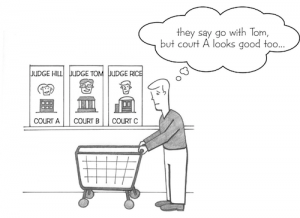In civil cases, forum shopping refers to the practice by some parties (mostly Plaint) to deliberately file the case in the Court or jurisdiction, which is most likely to give a favourable judgement or verdict. Forum shopping most typically occurs when two courts have concurrent jurisdiction over a claim. It is not a Litigants especially, Plaintiffs have long preferred the Delhi High Court for filing civil suits involving Intellectual Property. This fondness is mainly based upon the court’s willingness to grant ex-parte orders (without a defendant’s appearance).
However, this is all set to change as in a recent historic decision by the Supreme Court in the case of Indian Performing Right Society Ltd. V. Sanjay Dalia & Anr.¹, the Apex Court has held that if Plaintiffs in cases involving infringement of Trademark or Copyright carry on business in the same jurisdiction in which a cause of action arises then they cannot engage in forum shopping and must sue in courts having jurisdiction where they carry on business.
Background:
In this case, the Plaintiff’s head office was situated in Mumbai and they also had a branch office in Delhi. On the other hand, the defendant owned movie theatres in Mumbai and all across Maharashtra. Moreover, the alleged infringing activities also occurred in Mumbai. However, the plaintiff sued the Defendant in the Delhi High Court.
The Plaintiff was able to do so because of Section 134 of the Trade Marks Act 1999 and Section 62 of the Copyright Act, 1957 which allow a plaintiff to file a lawsuit in a court within whose jurisdiction it resides or carries on business. The Defendant for obvious reasons objected against invoking jurisdiction of Delhi High Court. Single Bench as well as Division Bench of the Delhi High Court ruled that the suit should be filed in Mumbai. This matter was then appealed before the Supreme Court.
In the appeal before the Supreme Court, two different matters were clubbed together owing to similar factual circumstances. The other suit was filed for trademark infringement where the registered office of the Plaintiffs was in Mumbai. They sued in Delhi for infringement, without any clarifications in their pleadings for doing so.
Decision:
Supreme Court held that the provision of section 62 of the Copyright Act, 1957 and section 134 of the Trade Marks Act, 1999 have to be interpreted in the purposive manner. The Court stated that the intention of the legislature was not to provide an additional forum to sue, but to connect the cause of action with the presence of the plaintiff.
The Court finally held that in the present case, the suit cannot be filed in Delhi. However, it must be kept in mind that this case had peculiar facts, namely, that the plaintiff’s head office was located in Mumbai and the cause of action also arose in Mumbai. However, this decision still keeps some wiggle room left for the Plaintiff to play with. For example, in present situation if the Plaintiff have offices in both Delhi and Mumbai and the Defendant is residing in Ahmedabad and cause of action also arose there, then also the Plaintiff can file a case in Delhi.
———————
1 Civil Appeal Number 10643-10644 of 2010




